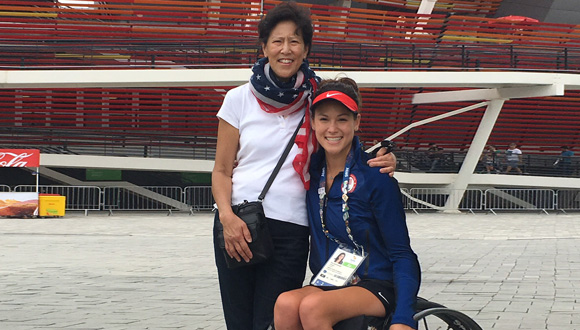
Arlene Wong
Children: Scott Mathewson, 32; Dana Mathewson, 27


What makes tennis a special part of your life?
Tennis and volleyball were my favorite sports in high school. I was an adequate player – good enough to get a high school letter and get pickup games at college but not good enough to play in a league. Tennis was a wonderful way to pass summer days.
Our family lived an active lifestyle, and Dana and her brother Scott were always involved in team sports, like soccer and softball. We had the good fortune to live near a community center with a tennis club. I would occasionally take the kids out to hit, and Scott would take tennis camp during the summer. I signed Dana up for maybe two different week-long camps prior to her getting sick with Transverse Myelitis and becoming paraplegic at age 10 ½.
Thank goodness Dana was in good physical shape, for it made her recovery and therapy easier. However, it was difficult adjusting to this “new normal,” as you can imagine. The smart, popular and athletic girl was now a passing memory, as far as she was concerned. I told Dana that she was not going to stay home watching TV all day. I had been told there were adaptive sports in downtown San Diego, and we were going to go down there to check it out. She hated going to play sports in strange wheelchairs with the other kids from all over the city, but I made her go, anyway. Despite doing well and making friends, she struggled
How did Dana start to play?
I saw an announcement for a local wheelchair tennis camp supported by the Kiwanis in Coronado,
Dana had not picked up a racquet in years. After the first day, I was asked if she had ever played before, as they wanted to put her in a more advanced group. Her recognized athleticism was not the incredible thing about this camp, though. The most important thing was that Dana had the opportunity to see grown, beautiful women in wheelchairs moving about gracefully. They took Dana aside and told her to embrace the sport – to go out and play and to not sit back.
The camp was a life-changer for her. They offered her a tennis chair if she promised to practice twice a week and to enter two tournaments a year. She looked them in the eye and said, “OK.” I put the strange little chair in the car, and on the way home, Dana said, “There’s a tennis tournament in Irvine next week. I want to go.”
Why do you think it’s important for her to play tennis?
I have tears in my eyes now. This USTA camp with Karin and Sharon did more for Dana’s healing than any therapies provided her after her illness. Tennis has been a way to keep fit, meet new people and travel the world on her own. Tennis has fostered self-confidence and maturity, and coaching tennis to new young campers helped her realize how far she has come. Playing tennis while attending college and graduate school requires planning and discipline, all good skills to have in life.
The hard work and training
Tennis has helped Dana spread her wings and fly. Wherever the sport takes her, this tennis mom is proud of her achievements and is grateful for the support of the USTA.
